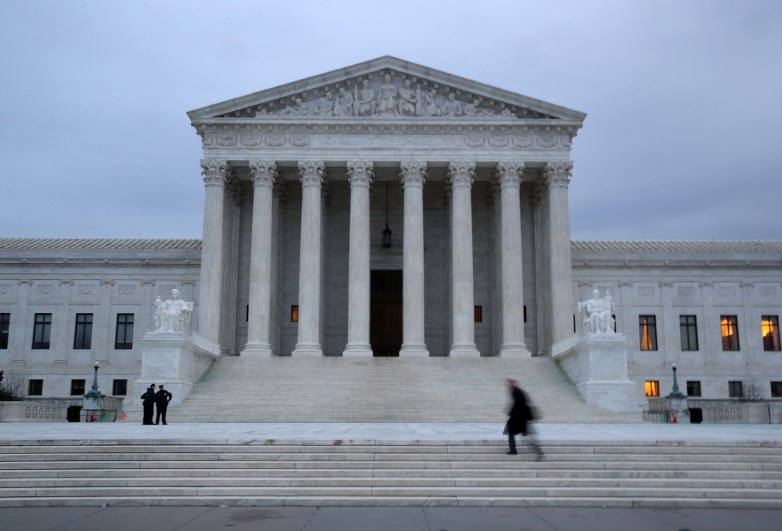
The U.S. Supreme Court. (Getty)
Some portions of President Donald Trump‘s controversial “travel ban” will go into effect, the Supreme Court of the United States ruled Monday.
The decision to do so reverses the action of lower federal courts, which put a stop to the policy for the time being. In addition, the Supreme Court agreed to hear the full case on the executive order in October.
The opinion from the Supreme Court is a partial victory for Trump after he vowed to challenge past rulings by courts as they continuously upheld injunctions on the ban. Some judges saw the ban, which halted travel from predominately-Muslim countries, as religious discrimination while others said that the order exceeded Trump’s authority.
The Supreme Court opinion had partial dissent from Justices Samuel Alito, Clarence Thomas and Neil Gorsuch. Those three agreed to allowed the ban to apply to all travelers, but they were overruled by the other six justices.
The opinion agreed to let travelers with a “credible claim of a bona fide relationship with a person or entity in the United States” into the country. People who can prove they have a relationship with a person in the U.S. will be allowed to enter while those that don’t from the countries listed — Iran, Libya, Somalia, Sudan, Syria and Yemen — will be denied entry. That portion of the ban goes into effect within 72 hours.
Previously, the order banned all travel from seven countries no matter what. That meant that refugees and those with green cards and visas would even be banned and it led to widespread confusion and protest when 746 people were temporarily detained at airports.
“As to these individuals and entities, we do not disturb the injunction,” the Supreme Court wrote in its opinion, which didn’t have an author listed. “But when it comes to refugees who lack any such connection to the United States, for the reasons we have set out, the balance tips in favor of the Government’s compelling need to provide for the Nation’s security.”
Read the full opinion of the Supreme Court in the document below:
The Supreme Court further explained the rationale for its opinion, saying that denying someone entry to the country that doesn’t have a relationship with someone already in it “does not burden any American party by reason of that party’s relationship with the foreign national. And the courts below did not conclude that exclusion in such circumstances would impose any legally relevant hardship for the foreign national himself.”
After the opinion was announced, the Department of Homeland Security released a statement saying that it would “provide additional details on implementation after consultation with the Departments of Justice and State.”
The Supreme Court today has allowed the Department of Homeland Security to largely implement the President’s Executive Order and take rational and necessary steps to protect our nation from persons looking to enter and potentially do harm. The granting of a partial stay of the circuit injunctions with regard to many aliens abroad restores to the Executive Branch crucial and long-held constitutional authority to defend our national borders.
The Department will provide additional details on implementation after consultation with the Departments of Justice and State. The implementation of the Executive Order will be done professionally, with clear and sufficient public notice, particularly to potentially affected travelers, and in coordination with partners in the travel industry.
The decision to act on the case in the fall comes as a surprise to some, because the Supreme Court typically only rules on cases when lower federal courts remain divided on the issue. And that wasn’t the case with the “travel ban.”
Previously, the 4th and 9th Circuit courts upheld rulings from district courts that blocked the ban. The 4th Circuit court ruled that the travel ban violated the Establishment Clause of the First Amendment and that it discriminated against Muslims. The 9th Circuit said that the executive order didn’t give enough justification for barring travel from over 180 million people based on their nationality, citing the Immigration and Nationality Act.
